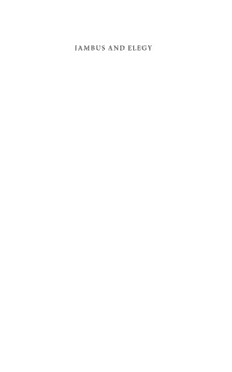Table Of ContentOUPCORRECTEDPROOF–FINAL,21/1/2016,SPi
IAMBUS AND ELEGY
OUPCORRECTEDPROOF–FINAL,21/1/2016,SPi
OUPCORRECTEDPROOF–FINAL,21/1/2016,SPi
Iambus and Elegy
New Approaches
Edited by
LAURA SWIFT AND CHRIS CAREY
1
OUPCORRECTEDPROOF–FINAL,21/1/2016,SPi
3
GreatClarendonStreet,Oxford,OX26DP,
UnitedKingdom
OxfordUniversityPressisadepartmentoftheUniversityofOxford.
ItfurtherstheUniversity’sobjectiveofexcellenceinresearch,scholarship,
andeducationbypublishingworldwide.Oxfordisaregisteredtrademarkof
OxfordUniversityPressintheUKandincertainothercountries
©OxfordUniversityPress2016
Themoralrightsoftheauthorshavebeenasserted
FirstEditionpublishedin2016
Impression:1
Allrightsreserved.Nopartofthispublicationmaybereproduced,storedin
aretrievalsystem,ortransmitted,inanyformorbyanymeans,withoutthe
priorpermissioninwritingofOxfordUniversityPress,orasexpresslypermitted
bylaw,bylicenceorundertermsagreedwiththeappropriatereprographics
rightsorganization.Enquiriesconcerningreproductionoutsidethescopeofthe
aboveshouldbesenttotheRightsDepartment,OxfordUniversityPress,atthe
addressabove
Youmustnotcirculatethisworkinanyotherform
andyoumustimposethissameconditiononanyacquirer
PublishedintheUnitedStatesofAmericabyOxfordUniversityPress
198MadisonAvenue,NewYork,NY10016,UnitedStatesofAmerica
BritishLibraryCataloguinginPublicationData
Dataavailable
LibraryofCongressControlNumber:2015941010
ISBN 978–0–19–968974–3
PrintedinGreatBritainby
ClaysLtd,StIvesplc
LinkstothirdpartywebsitesareprovidedbyOxfordingoodfaithand
forinformationonly.Oxforddisclaimsanyresponsibilityforthematerials
containedinanythirdpartywebsitereferencedinthiswork.
OUPCORRECTEDPROOF–FINAL,21/1/2016,SPi
While the volume was in press, we learned of the sad
death of Martin West, who contributed so much
to our understanding of Greek iambus and elegy.
In recognition of that contribution the editors
dedicate this volume to his memory.
1 September 2015
OUPCORRECTEDPROOF–FINAL,28/3/2016,SPi
List of Contributors
MargaritaAlexandrouisaTeachingFellowandHonoraryResearch
FellowatUCL.
Antonio Aloni was professor of Greek Literature at University of
TrentoandUniversityofTorino.
Deborah Boedeker is Professor Emerita of Classics at Brown
University.
EwenBowieisanEmeritusFellow,CorpusChristiCollege,Oxford.
ChristopherG.BrownisWilliamSherwoodFoxProfessorofClassics,
UniversityofWesternOntario.
ChrisCareyisaProfessorofGreekatUCL.
Paula da Cunha Corrêa is Associate Professor in the Departamento
deLetrasClássicas,UniversidadedeSãoPaulo.
JuliaNelsonHawkinsisAssistantProfessorofClassicsatOhioState
University.
Tom Hawkins is Assistant Professor of Classics at Ohio State
University.
AlessandroIannucciisAssociateProfessoratUniversityofBologna,
DepartmentofCulturalHeritage.
DonaldLavigneisAssociateProfessorandHeadofClassicsatTexas
TechUniversity.
LauraLulliAssegnistadiRicercaatLaSapienza–UniversitàdiRoma.
Anika Nicolosi is Ricercatrice of Greek Literature, Università degli
StudidiParma.
Cecilia Nobili is Assegnista di Ricerca in Greek Literature at the
UniversitàdegliStudidiMilano.
OUPCORRECTEDPROOF–FINAL,21/1/2016,SPi
x ListofContributors
Andrea Rotstein is Associate Professor of Classics at Tel Aviv
University.
DavidSiderisProfessorofClassicsatNewYorkUniversity.
LauraSwiftisLecturerinClassicalStudiesintheOpenUniversity.
OUPCORRECTEDPROOF–FINAL,21/1/2016,SPi
Preface
ThisvolumeassemblesselectedpapersfromtheconferenceonGreek
iambusandelegyheldatUCLon11–13July2012.Wewouldliketo
thank our sponsors, UCL Department of Greek and Latin and Arts
andHumanitiesFacultyInstituteofGraduateStudies,theInstituteof
Classical Studies, and the Society for the Promotion of Hellenic
Studies, for helping to make the event possible, all who participated
in theevent formaking itsuch anenjoyableand memorableexperi-
ence and all our collaborators in the final publication for easing the
taskoftheeditors.
LauraSwift/ChrisCarey
20December2014
OUPCORRECTEDPROOF–FINAL,21/1/2016,SPi
Introduction
0.1. WHY IAMBUS AND ELEGY?
The study of early Greek poetry has undergone a renaissance in
recentdecades,fuelledbyasteadystreamofpapyrologicaldiscoveries
thatcontinuetotransformourknowledgeofthecorpus.Atthesame
time,methodologicaldevelopmentsinareassuchaspoeticpersonae,
ancient concepts of genre, and the importance of performance con-
text have changed the way that scholars discuss these texts. This
resurgenceofinterestcanbeseeninthenumberofnewtitlesdealing
with archaic poetry that have appeared in recent years, such as the
editedvolumesbyBudelmann(2009),AthanassakiandBowie(2011),
and Cazzato, Lardinois, Martin, and Peponi (2015). Yet despite this
growth,thelion’sshareofscholarlyinteresthasbeendevotedtomelic
poetry,withiambusandelegyrelegatedtoalesserposition.However,
iambusandelegywerebothveryimportantintheirownrightwithin
the performance culture of archaic Greece and also very significant
for the development of Hellenistic and Roman poetry and thus for
the shaping of later Western literature. Their influence can be seen
inlaterformsoflovepoetry,funeraryelegy,comedy,andsatire,and
an exploration of the genres is therefore of interest to scholars of
Europeanliteratureofallperiods.Itwasthisrelativeneglectthatled
to the birth of this volume, originally based on an international
conference held at UCL in 2012, which was to our knowledge the
firstconferencetofocusexclusivelyoniambicandelegiacpoetry.
Several factors influenced our decision to take iambus and elegy
together, rather than producing a volume that focused on one form
ortheother.The first isthe weightof history. Ourearliest surviving
iambic poet, Archilochus, is also our earliest elegist. Archilochus’
Iambus and Elegy. Laura Swift and Chris Carey.
© Oxford University Press 2016. Published in 2016 by Oxford University Press.
OUPCORRECTEDPROOF–FINAL,21/1/2016,SPi
2 IambusandElegy:NewApproaches
example was followed by Solon, who also composed in both forms.
Theformswerethereforeconnectedinthearchaicperiod,anditwas
accepted from an early stage that a single poet might well choose to
coverboth.Conversely,itwasnotuntilthetimeofSimonidesthata
melic poet could establish himself as a composer of elegiac verse.
Boundaries between forms and performance modes in the archaic
and classical world tend to be strong, often impenetrable (we might
recall the debate in the Symposiumon the separation of tragedy and
comedy (223d)), and the pairing of iambus and elegy is therefore
significant.Theseareformswhichwerefelttobesisters.Thefactthat
more thanonearchaicauthorcomposedinbothhasalsoinfluenced
modernclassicalscholars.Severalofthemajorscholarlyeditionstreat
both the forms together, most significantly West’s Iambi et elegi
Graeci, now the standard text for these authors, and his companion
volumeStudiesinGreekIambusandElegy.1
Finally,therearemethodologicalsimilaritiesbetween thestudyof
iambusandthatofelegythatmakeitfruitfultoexaminethemsideby
side. Iambus and elegy are forms that resist easy definition, and in
both cases attempts later in antiquity to find a ‘core’ meaning to the
genres led to disjuncture from the archaic forms. Both iambus and
elegy pose problems because of their diversity, and because their
metrical forms (the tool most commonly used by ancient scholars
to categorizepoetry) span multiplegenres.Inthe caseof iambus, by
the fourth century BC, invective was considered the defining feature,
yetasscholarshavenoted,thisnarrowingofthegenreoverlooksthe
range of tones found in archaic iambus.2 For elegy, the water is
muddied by the use of terminology such as elegos to denote grief
and mourning, themes whose relevance to literary elegy from the
archaicperiodhavebeenmuchdisputed.3Boththese,then,arepoetic
formswheredefinitionalquestionshavedominatedscholarlydiscus-
sion,andwheremoreremainstobedoneintermsofdetailedanalysis
ofthepoetryitself.
Thisbookaimsto explorewhatisdistinctiveabout Greekiambus
andelegy,andseekstore-establishthemasmajorpoeticforms.The
1 Cf.alsoEdmonds(1931);Adrados(1990).
2 For a full discussion see Rotstein (2010),and see also her contribution in this
volume.
3 For discussion of this issue, see Page (1936); West (1974) 4–7; Faraone (2008)
132–5;AloniandIannucci(2007)14–16,68–9,203–4;Lulli(2011)12–20;Nobili2011.

